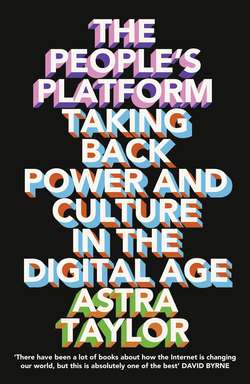Читать книгу The People’s Platform: Taking Back Power and Culture in the Digital Age - - Страница 7
3 WHAT WE WANT
ОглавлениеToday it is standard wisdom that a whole new kind of person lives in our midst, the digital native—“2.0 people” as the novelist Zadie Smith dubbed them. Exalted by techno-enthusiasts for being hyper-connected and sociable, technically savvy and novelty seeking—and chastised by techno-skeptics for those very same traits—this new generation and its predecessors are supposedly separated by a gulf that is immense and unbroachable. Self-appointed experts tell us that “today’s students are no longer the people our educational system was designed to teach”; they “experience friendship” and “relate to information differently” than all who came before.1
Reflecting on this strange new species, the skeptics are inclined to agree. “The cyber-revolution is bringing about a different magnitude of change, one that marks a massive discontinuity,” warns the literary critic Sven Birkerts. “Pre-Digital Man has more in common with his counterpart in the agora than he will with a Digital Native of the year 2050.” It is not just cultural or social references that divide the natives from their pre-digital counterparts, but “core phenomenological understandings.” Their very modes of perception and sense making, of experiencing the world and interpreting it, Birkerts claims, are simply incomprehensible to their elders. They are different creatures altogether.2
The tech-enthusiasts make a similarly extreme case for total generational divergence, idolizing digital natives with fervor and ebullience equal and opposite to Birkerts’s unease. These natives, born and raised in networked waters, surf shamelessly, with no need for privacy or solitude. As described by Nick Bilton in his book I Live in the Future and Here’s How It Works, digital natives prefer media in “bytes” and “snacks” as opposed to full “meals”—defined as the sort of lengthy article one might find in the New Yorker magazine. Digital natives believe “immediacy trumps quality.”3
They “unabashedly create and share content—any type of content,” and, unlike digital immigrants, they never suffer from information overload. People who have grown up online also do not read the news. Or rather, we are told, for them the news is whatever their friends deem interesting, not what some organization or authoritative source says is significant. “This is the way I navigate today as well,” Bilton, technology writer for the New York Times, proudly declares. “If the news is important, it will find me.”4 (Notably, Bilton’s assertion was contradicted by a Harvard study that found eighteen- to twenty-nine-year-olds still prefer to get their political news from established newspapers, print or digital, than from the social media streams of their friends.)5
